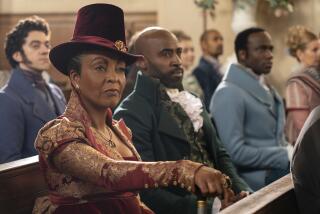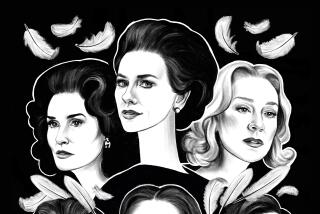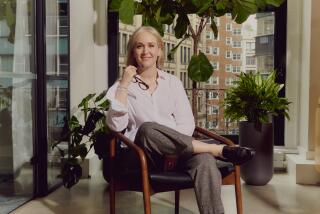‘Downton Abbey’ Season 6 premiere recap: Mrs. Patmore, world’s greatest friend
We should all be lucky enough to have a friend like Mrs. Patmore in our lives.
Of the many thankless tasks Downton Abbey’s tireless cook has had to perform in her decades of service - the countless puddings, aspics and crown roasts she’s slaved over -- could anything really be as difficult as asking Carson if he wants to get it on with Mrs. Hughes?
See more of Entertainment’s top stories on Facebook >>
But Mrs. Patmore, bless her heart, gets the job done, perhaps compelled by the awareness that, as awkward as the conversation is for her, it’s infinitely more difficult for her two dear friends. Carson and Mrs. Hughes’ evolving relationship is handled with the humor, tenderness and candor that have always been a part of “Downton Abbey’s” DNA, taking what might be subtext in another kind of period drama and making it the text: Neither Carson nor Mrs. Hughes has been married before, which means neither has much sexual experience. They might even be virgins, for all we know.
In any case, marriage will present many challenges for the couple, not the least of which will be getting used to being intimate with each other after a lifetime spent buttoned up, both literally and figuratively. It’s no wonder that Mrs. Hughes is so nervous, she keeps postponing the wedding date. Leave it to Carson to put her at ease in the most graceful way possible. Via Mrs. Patmore, he assures Mrs. Hughes that she is beautiful, and that he wants “a real marriage, a true marriage with everything that that involves.”
“I am happy and tickled and bursting with pride that she would agree to be my wife and I want us to live as closely as two people can for the time that remains on Earth,” he says, prompting millions of “Downton Abbey” fans across the country to go “awwww” and clutch their hearts in unison.
In a deeply personal way, Carson and Mrs. Hughes’ journey from friendship to romance reflects the broader social changes afoot in mid-1920s England. Surely one of the forces that brought these two together is an awareness that their jobs may not exist for much longer -- that the days of butlers and housekeepers running great houses are numbered.
One of the delightful contradictions of this series has always been that, despite all the talk of change, things always seem to be the same. Characters die, give birth, inherit or lose fortunes, go to war and fall in love, but Edith will be unlucky in love and Thomas will somehow remain employed despite being the most untrustworthy employee of all time.
But as “Downton Abbey” begins its long goodbye, change is in the air -- like, for real this time. Not only are the Crawleys managing to scrape by with just one hall boy and two housemaids, further cuts may be necessary if they want to avoid the fate of the poor Darnley family, forced to sell their estate, Mallerton Hall, and auction off its contents in the world’s fanciest garage sale. While Lord Grantham et al seem concerned about Sir John and his family, Daisy puts it all in perspective -- perhaps a bit too forcefully -- by reminding them that Mr. Mason, a tenant farmer who may be evicted by the new owners of Mallerton, has a lot more to lose than some fancy tchotchkes.
Another sure sign of progress: Anna and Bates finally catch a break when the woman who actually killed Green decides to confess, thereby liberating the world’s unluckiest couple from their many years of legal troubles. The development prompts a major celebration at Downton, complete with chilled bottles of Veuve Clicquot and some tunes on the gramophone. But as always with the Bateses, it’s not all good news: We learn that on top of a host of legal issues, Anna is also struggling with infertility, having endured multiple miscarriages. Let’s hope they overcome this latest challenge before the series ends.
Edith decides she’s had enough of country living and will move into Gregson’s old flat in London, where, as she tells her Aunt Rosamund, “People aren’t so curious” and she can raise Marigold without becoming the subject of gossip. Added bonus: She’ll be far away from Mary. I for one applaud this move, and look forward to seeing Edith rub elbows with the Bright Young Things and the Bloomsbury Group while wearing all manner of fabulous outfits. Do I smell a Lady Edith spinoff in the works? Pretty please?
Even Thomas seems to be a changed man, frolicking with children and trying to keep his job not by scheming or conspiring but by -- would you believe it -- performing it well? Wonders never cease.
OK, OK, I lied: A few things remain the same. Best frenemies Isobel and Violet have found yet another thing to feud about. This time, it’s the village hospital, which may or may not merge with the county hospital. Yadda yadda yadda, it doesn’t really matter; the subplot exists solely for Maggie Smith and Penelope Wilton to lob zingers at each other, which they do as delightfully as ever.
Something else that is still true on “Downton Abbey”: Never trust a working-class girl in a cloche hat!
Julian Fellowes seems to have a thing about blue-collar women, doesn’t he? First there was that maid who seduced Branson and tried to trick him into marrying her. Then there was Branson’s lady friend, Miss Bunting, a.k.a. “That Awful Woman Who Kept Ruining Dinner.”
And now we’ve got Miss Bevan, a chambermaid who worked at the Liverpool hotel where Lady Mary shacked up with Lord Gillingham and who threatens to run to the papers with the tale -- that is, unless Mary forks over a thousand pounds. Crass, aggressive and exploitative, Miss Bevan embodies everything the aristocracy fears about the lower classes. Just to drive the point home, she says things like “Your lot’s finished. You’re going down and we’re coming up,” while helping herself to one of the biscuits on Mary’s tea tray.
But more troubling than this unfortunate stereotyping is Mary’s indiscretion. Evidently she used her own name in the hotel register, something that strikes me as a serious rookie mistake, especially for someone who’s already come very close to having her sex life exposed in the pages of a newspaper. (Remember the whole thing with Mr. Pamuk and Sir Richard? Apparently Mary doesn’t.)
Lord Grantham ultimately comes to the rescue by writing Miss Bevan a check for 50 pounds and getting her to sign an agreement saying she’ll leave Mary alone. But if I know one thing about “Downton Abbey,” this won’t be the last we hear of this villainness. Mary, watch your back.
Follow @MeredithBlake on Twitter.
ALSO:
Cord cutters face a sea of streaming options
“Winter” isn’t coming: George R.R. Martin hasn’t finished “Game of Thrones” book
Review: Cumberbatch and Freeman go Victorian in “Sherlock: The Abominable Bride”
More to Read
The complete guide to home viewing
Get Screen Gab for everything about the TV shows and streaming movies everyone’s talking about.
You may occasionally receive promotional content from the Los Angeles Times.






